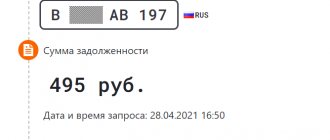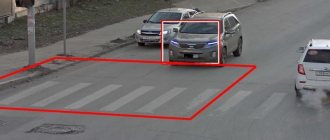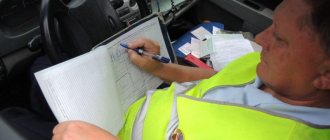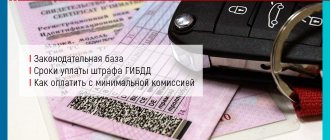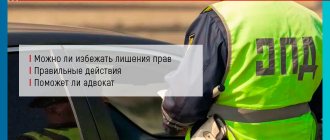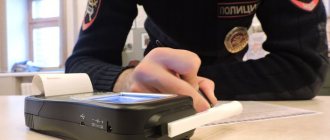The principle of operation of video recording cameras
There are photo and video cameras in every city. Moreover, the installation of cameras in rural areas has long begun. Their popularity can be explained by the fact that they monitor the roads around the clock and record all violations. High-precision instruments allow you to accurately record the license plate number of a vehicle that has violated traffic rules.
The operating principle of the cameras is simple and effective: the video taken of the offender is immediately transferred to TsAFAP. Next, the driver is searched using the State Traffic Inspectorate database. And after some time, the traffic violation violator will receive a receipt with a fine and a photograph of his car at the time of the violation. The drivers themselves call these receipts “letters of happiness.”
TsAFAP is a center for automatic recording of administrative violations of the traffic police.
Who sends us “letters of happiness”
It is important to emphasize once again: the photo-video recording system does not issue a fine, but only records the fact of violation
and transfers the collected materials to TsAFAP - regional centers for automatic recording of administrative offenses. And it is there that traffic police inspectors review the received content, reject those photographs and videos that were received by mistake, and only then make decisions. In other words, the role of the camera is to collect evidence of a violation and transfer it to the competent authorities.
Initially, materials are automatically checked.
Its task is to identify the correspondence of license plates read by the camera with registration data, determine the owner of the car and its registration address. Another important purpose of such a check is to determine whether a particular driver is subject to punishment. For example, cameras monitoring lanes for route transport record the license plates of all vehicles that move along it. But for buses or taxis this is not a violation, and materials in which such an event is recorded are discarded at this stage.
Then the selected evidence is submitted to the CAFAP employee for consideration.
- traffic police inspector. And only he, having reviewed the materials from the cameras, makes a decision about whether the recorded case is a violation of traffic rules, and whether the driver’s actions are subject to punishment.
Further events are clear: the decision made is entered into special databases, and a “chain letter” is sent to the violator.
What does a CCTV camera record?
To date, cameras record the following violations:
- traffic disruption at intersections and pedestrian crossings;
- driving a car without a seat belt fastened;
- over speed;
- parking in the wrong place;
- driving into the oncoming lane;
- section of dividing strips;
- violation of stopping rules.
The entire process of camera operation is automatic. Thus, the influence of a living person who can make mistakes is minimized. In theory, such a system should be fail-safe. Unfortunately, in practice this is not entirely true. There are cases when drivers receive chain letters by mistake.
Typical system errors
The system can also make mistakes. The most common mistakes:
1. Speeding. Cameras are a very high-precision device that can record speeding by 2 km/h or more. But in practice there are also funny cases. For example, a resident of the city of Samara received a fine for speeding. He accelerated his car to 300 km/h. The most interesting thing is that he was driving a Zhiguli. Such fines can be easily challenged. It is much more difficult to challenge a fine for speeding by 10 - 20 km per hour.
2. Wrong car . On the roads you can find cars that are exactly alike. In such cases, the system may confuse the car with a duplicate offender. A completely different driver may receive a fine. To avoid an unfair fine, you need to prove that the driver was in a completely different place at that time. Evidence may include:
- testimony of witnesses;
— information from the DVR;
— video from CCTV cameras.
3. Human factor . Each video from the cameras is first carefully studied by the inspector, and then he sends a receipt with a fine. Since there is a lot of video material and few specialists, unfortunately, errors are possible. The “letter of happiness” may be received by the wrong driver. Such errors are not difficult to challenge. To do this, you need to contact the State Traffic Inspectorate and explain the situation. When re-analyzing the violation, the inspector will be more attentive.
4. Another owner. After selling the car, the new owner is given 10 days to register the car. If he did not do this and violated traffic rules, then the old owner will receive a fine. To appeal a fine, you must provide evidence that the car was actually sold. The following can be used as evidence:
Contract of sale. A document confirming the return of money, confirming the unused compulsory motor liability insurance.
It’s difficult to appeal letters of happiness from the traffic police, but it’s possible
Drivers across the country are sounding the alarm: mail notifications of traffic violations recorded by cameras are often not true. Many claim that their car was not in the indicated place, and some even believe that the images are a photomontage. As evidence, they show footage in which, for example, only the shadow of a car is visible. We are also outraged by cases where fines were paid long ago, but remain in the traffic police database. The system itself often malfunctions, and letters may contain an incorrect registration number.
“If the owner of the car does not agree with the ruling, he can appeal to the district court at the place where the offense was committed. This must be done within the ten-day period established by law, indicating the cause and circumstances of the incident,” advises Sergei Matushkin, an administrative lawyer at our legal center.
Drivers are inventing new ways to deceive the ubiquitous video cameras recording violations. The surest way to make your license plate invisible is ordinary street dirt, which covers your car if it is not washed for several days. There is also a fine for this if the traffic police pay attention to the car. In Moscow, all information about violations recorded automatically flows to the traffic control center. There, dozens of specialists process data received from devices around the clock. Then they are checked by State Traffic Inspectorate employees. The amount of work is enormous, and even such a unique filter does not exclude possible errors.
“There are a number of compelling circumstances that make it possible to challenge a decision in court, including formal ones. For example, the lack of a digital signature, which allows you to find out who processed the received image from the camera. It can take up to two months to consider a complaint,” says administrative lawyer Sergei Matushkin.
More than one and a half thousand cameras are installed in the capital, which record about thirty thousand violations every day. It is clear that the human factor can play a role, often leading to very curious cases. Last summer, a resident of Kazan was involved in a minor accident. The damaged car was loaded onto a tow truck, and soon a “letter of happiness” was received, in which the moment was recorded when the foreign car was moving at excessive speed, however, at that moment it was on the platform of a special vehicle. There was, of course, a violation, but the fine came to an absolutely innocent person.
“You can appeal decisions, but only if you are 100 percent sure of the mistake. Practice shows that the court, most often, does not side with the driver. Cameras are an automatic and impartial witness to violations, and therefore most notifications remain in force,” sums up administrative lawyer Sergei Matushkin.
Deadline for appealing a fine
In accordance with Art. 30 clause 3 of the Code of Administrative Offenses, the driver is given 10 days so that he can challenge the fine for violating traffic rules. Time is counted from the moment the “letter of happiness” is received. You can find out about the presence of a fine even earlier. To do this, you need to go to the traffic police website or the website of the Unified Portal of State Services.
If for some reason the driver missed the time to appeal the fine, then you need to send a petition to the Traffic Police to restore the deadline.
There is no filing fee for appealing administrative fines.
Actions upon receiving a letter from the bailiffs
If you receive a letter from the bailiffs and the debtor agrees with the amount of the debt, then it is best to pay it off within the time limits established by law or specified in the writ of execution. According to the law, the period for repayment is five days, unless otherwise specified in the writ of execution. If the debtor does not currently have the opportunity to pay the full amount (loan debts may be large, and the debtor may have lost his job, etc.), he can apply to the court with a request for installment payments/deferment of payments. The application should describe the situation and confirm, as far as possible, the circumstances that are difficult for repaying the loan. If the decision is positive, the debtor may receive a new order from the court with a different payment schedule.
If the obligations specified in the letter have been repaid, you need to contact the bailiff service from which the letter came, attaching documents confirming payment and obtain from them a decree to terminate the proceedings, which can be submitted to other authorities if necessary.
Recently, you may encounter fraudulent activities in which you receive a letter by email with the subject line indicating that it is from the bailiff service. In this case, you should not open it, as it may contain a virus. It is better to go to the service’s website and check your name in the electronic register of cases. There you can see the details of the bailiff responsible for your enforcement proceedings, if there is one. After this, you will have to contact the bailiff to find out the details if you did not receive them in full electronically on the website.
Author of the article
Drawing up a complaint to appeal a decision
You can make a complaint in free form. There is no set form for this type of document. But, despite the free form, the complaint must contain a number of mandatory elements. You must specify:
1 Full name and position of the person to whom the complaint is addressed.
2 Full name and contact details of the applicant.
3 Date and number of the fine.
4 Brief description of the situation.
5 Arguments refuting the facts due to which the decision was made.
6 Request to cancel the decision.
7 List of additional documents and evidence. For example:
A copy of the resolution. Photo and video materials. Documents that will confirm that the driver is correct.
8 Date and signature.
Consequences of failure to pay a fine
The biggest mistake drivers make is ignoring a fine. In accordance with Art. 32 clause 2 of the Code of Administrative Offenses, the violator is given 60 days to pay the fine. The fine must be paid or appealed. In any case, this issue needs to be resolved. If the allotted time to pay the fine has expired, and the driver continues to do nothing, then TsAFAP employees draw up a second resolution and send it to the bailiffs. For the offender, this may mean:
Doubling the amount of the fine. 50 hours community service. Restriction on leaving the country.
Inaction is punishable. Even if the driver is 100% right, but continues to ignore the fine, then it will be very difficult to change the situation in his favor.
Attention!
Due to frequent changes in the legislation of the Russian Federation, the information on the site may be out of date. Each case is unique in its own way. Basic information may not help solve your problem. Therefore, contact our lawyer for a free consultation!
